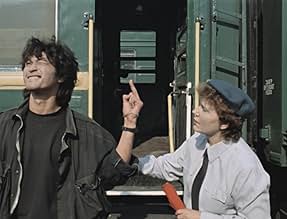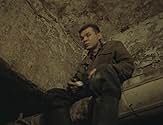Moro returns to Alma Ata to collect money owed to him. While waiting out an unexpected delay, he visits his former girlfriend Dina, and discovers she has become a morphine addict. He decides... Read allMoro returns to Alma Ata to collect money owed to him. While waiting out an unexpected delay, he visits his former girlfriend Dina, and discovers she has become a morphine addict. He decides to help her kick the habit and to fight the local drug mafia responsible for her conditio... Read allMoro returns to Alma Ata to collect money owed to him. While waiting out an unexpected delay, he visits his former girlfriend Dina, and discovers she has become a morphine addict. He decides to help her kick the habit and to fight the local drug mafia responsible for her condition. But Moro finds a deadly opponent in "the doctor," the mafia kingpin who is exploiting D... Read all
- Director
- Writers
- Stars
- Awards
- 1 win total
- Nurse
- (as Ajkhan Chatayeva)
- Director
- Writers
- All cast & crew
- Production, box office & more at IMDbPro
Featured reviews
Viktor Tsoy movie
That very "Tsoy" needle for your high-tech brain
"Igla" is one of those loaded movies. Maybe you should have spent your teen years in the 1980s-1990s to feel its drive. Or perhaps you should be kind of out-of-this-world. Or, maybe, just a very romantic and un-CGI dreamer. Or corny and unpretentious fellow, who enjoys cinema without cornflakes & Coca-Cola. Or insane... Just make sure that you are watching the original "Igla", not a glamour remix/remake, which, as this treacherous cinema business rotates today, does exist too.
Oh, almost forgot to say a couple of words regarding the essence of the movie. It's about a bunch of young degenerates living on the ashes of the once prolific empire (USSR). You cannot blame these weirdos - the older generation led them into a dead end.
A 10 out of 10 for this greyish no-escape flick from the amazing 1980s. Thanks for attention.
Enjoyable and fairly well done, if modest and broadly unremarkable
I'll say this: whatever one thinks of the "New Wave" veneer (for my part, while "hostile" is too potent a word, I can't say I specifically think much of it), it's not so central to the feature as to significantly detract from the value this otherwise represents. Taken in and of itself, the story is earnestly compelling, and actually relatively simple as protagonist Moro reconnects with an old girlfriend and finds that she's in need of help. The details of that story enrich the experience, and the scene writing is likewise quite strong; the characters are sympathetic and at least indirectly relatable, and while perhaps not fully fleshed out are given sufficient identity and personality to make us care about them. Meanwhile, in all those ways that matter most the movie is pretty sharp in its construction - indicative of limited resources, perhaps, but admirably well done within those constraints. Nugmanov demonstrates a terrifically keen eye at points for outstanding shot composition, and for generally orchestrating shots and scenes. Aspects like the filming locations, set design, cinematography, and costume design, and even those few stunts and effects that are employed, are at once a minor treat for the eyes, modest, and charming, and lend a small sense of verisimilitude to the proceedings. Combine such facets with Nugmanov's direction and the result is more engaging than how it first comes off. Moreover, while I disagree that all the choices made here were good ones, I'll at least allow that the work behind them is appreciable. The cast is swell, if not majorly remarkable, and I certainly enjoy the songs of Kino that greet us on the soundtrack.
I think the main factor diminishing my favor here is that the stylistic flair is more unnecessary than it is useful or meaningful, and often at least distracting if not also off-putting. Some of the choices made here evoke bewilderment at the emptiness more than anything else; as far as I'm concerned some whole scenes could or should have been trimmed, substantially revised, or even omitted outright without losing anything. Even setting that aside, I don't believe 'The needle' is anything so special as to altogether demand viewership in any capacity - it's enjoyable, but not crucial. Then again, mileage will certainly vary from one viewer to the next, and no doubt others emphatically like it or dislike it more than I do. I guess I'm of the mind that if one is a supreme devotee of all things "New Wave," or digging deep into cinema of the former Soviet Union, this this is probably a higher priority; for wide audiences, maybe you're best served by simply setting it aside for a lazy day when you want something good to watch but not necessarily something that wholly spellbinds and requires heavy engagement. There are elements of this that at best add nothing to it and at worst detract from the viewing experience, but nonetheless it's suitably capable that it's much more worthwhile than not. Don't go out of your way for it, and bear in mind the film-making approach that's taken here, but 'The needle' is a decent way to spend some time if you do have the chance to watch.
New Wave Kazakh Cinema, Viktor Tsoi, and the USSR
I am a huge fan of the band KINO (I remember first hearing their work in the mid-80s). I sat down with the director, Nugmanov, who is a great person. I have also seen "The Wild East." I love foreign cinema. Does this mean that my review is biased? Yes, to a point....
"The Needle" (only available on DVD either non-subtitled from Russia or in PAL format with multi-subtitles from Sweden), is "one of those movies for those who were fans of Tsoi." You'll read this over and over and over again! However, by only taking that position, one doesn't understand the HISTORIC importance of a band like KINO or a movie of this type.
Once upon a time, there was a place called the USSR. There was no allowance for individual expression, nor was there any films that were outside of State ideology. There was no drug use there. There were no gangs or blackmarket. That's how it was. Right??? NO. For one, Tsoi was extremely popular, and his lyrics were beautiful and poetic, and his music illegal. Movies that never existed (in the eyes of the State) somehow did exist ("The Kommissar," "Benya Krik," "Color of Pomegranates"). The Soviet Union had its problems, just like every country. When you think "Vodka," what country pops into one's head? It was great to be the state and control EVERY aspect of one's life for Socialism.
However, there were some great break-away filmmakers that wanted more, regardless of what SSR they originated. Tarkovsky was one (he went into self-exile), Paradjanov was "crucified" by authorities, but others, like Romm, were able to toe that fine line. How some other movies passed while others didn't is well worth analyzing. Nugmanov, who was best friends with Tsoi, made this sole feature that starred the late rock star. Because of this, Nugmanov's "Igla" and "The Far East" shall go down into history books as significant to the study of the Soviet Union (and glasnost), film, and music (and the Kazakh New Wave cinema movement). These movies were made in the waning years of the Soviet Union...
The movie is nearly a type of "commercial" vehicle for Tsoi, but it is also a "slap in the face" to the socialist regime that attempted to squelch free speech. Note the huge ship in the middle of a dried-up sea (I believe the Aral). The Kazakh people, like Nugmanov, definitely saw that their country was destroyed by socialist policy. Like the Indians in North America with alcohol abuse, drug abuse was a way of life in the SSR, but not allowed to be shown. There is no happiness through socialist realism. In reality, the SSR is barren, overcast, seedy, and sad. That it the way Nugmanov showed it, and he enjoyed placing Tsoi as the lead in it. There are other great characters (and acting) in the movie, most notable is Dina (Smirnova) and Spartak (Bashirov).
Oh, and the movie is about drug abuse and failed policy, but also about the coolness of Tsoi. But the "needle" could refer to the feel-good socialist realism that is like a drug by the State to distance or hide people from the reality of life. It can also be Nugmanov using film as a needle to inject the audience with a bit of reality.
Note how scenes of the movie begin and end with television programs. Try to "read" that!
It's not an entirely original plot, but it sure is a good movie, even with its ambiguities (like, why has Tsoi returned and who is he?). Decent film compositions, use of acting talent, and, yes, music by KINO!
9 of 10. ------- E.
This Kazakh new wave film by Rashid Nugmanov continues to be a profound influence on viewers.
Did you know
- TriviaThe movie set off a movement that has come to be known as the "Kazakh New Wave." The film also became a model for the Russian version of postmodernism.
- ConnectionsEdited from Escape from New York (1981)
- How long is The Needle?Powered by Alexa
Details
Box office
- Gross worldwide
- $25,387
























